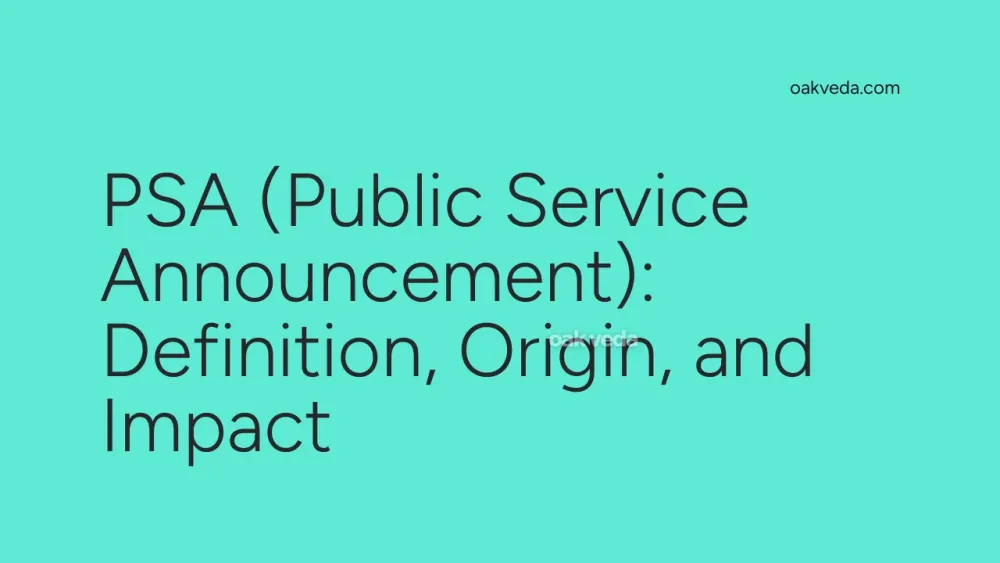
What is PSA (Public Service Announcement)?
A PSA, or Public Service Announcement, is a message designed to inform, educate, or raise awareness about important social issues, public health concerns, or community initiatives. In the context of social media, PSAs have evolved from traditional broadcast media to become powerful tools for spreading information quickly and effectively across digital platforms.
Origin and Development of PSA
Public Service Announcements have a rich history dating back to the early days of radio and television. However, their transition to social media has revolutionized their reach and impact:
- 1940s-1950s: PSAs emerge on radio and TV, often addressing wartime efforts and public health.
- 1970s-1990s: Iconic PSAs like "This is Your Brain on Drugs" gain widespread recognition.
- 2000s: The rise of the internet begins to change how PSAs are distributed.
- 2010s-Present: Social media platforms become primary channels for PSA dissemination, allowing for viral spread and targeted messaging.
How PSAs Work on Social Media
On social media, PSAs leverage the platforms' unique features to maximize their impact:
- Visual Appeal: Utilizing eye-catching graphics, infographics, and short videos to capture attention in crowded feeds.
- Shareability: Encouraging users to share content, amplifying the message organically.
- Hashtags: Using relevant hashtags to increase discoverability and track campaign performance.
- Targeting: Leveraging social media algorithms to reach specific demographics or interest groups.
- Interactivity: Engaging audiences through polls, quizzes, or challenges related to the PSA's message.
Types of PSAs on Social Media
PSAs on social media come in various forms, including:
- Health and Safety: Promoting vaccinations, mental health awareness, or road safety.
- Environmental: Raising awareness about climate change, pollution, or conservation efforts.
- Social Issues: Addressing topics like racial equality, gender rights, or poverty.
- Community Initiatives: Promoting local events, fundraisers, or volunteer opportunities.
- Emergency Information: Providing updates during natural disasters or public health crises.
Popular Examples of PSAs on Social Media
Several PSA campaigns have achieved significant success on social media:
- ALS Ice Bucket Challenge: Raised awareness and funds for ALS research through viral video challenges.
- #MeToo Movement: Sparked global conversations about sexual harassment and assault.
- COVID-19 Safety Messages: Promoted handwashing, mask-wearing, and social distancing during the pandemic.
- Black Lives Matter: Raised awareness about racial injustice and police brutality.
- Climate Action: Campaigns like #FridaysForFuture mobilized youth for climate change awareness.
Impact of PSAs on Social Media Culture
PSAs have significantly influenced social media culture:
- Increased Awareness: Social media PSAs have made it easier to educate large audiences about important issues quickly.
- Viral Potential: The shareability of social media content allows PSAs to reach millions within hours.
- Youth Engagement: PSAs on platforms like TikTok and Instagram have effectively engaged younger audiences in social causes.
- Real-time Response: Social media enables rapid dissemination of critical information during emergencies.
- Behavior Change: Well-crafted PSAs can inspire tangible actions and lifestyle changes among viewers.
Controversies Surrounding PSAs on Social Media
While PSAs on social media have proven effective, they're not without controversy:
- Misinformation: The rapid spread of PSAs can sometimes lead to the circulation of inaccurate information.
- Slacktivism: Critics argue that social media PSAs may promote superficial engagement rather than meaningful action.
- Oversaturation: The abundance of PSAs on social platforms can lead to audience fatigue or desensitization.
- Privacy Concerns: Some PSA campaigns collect user data, raising questions about privacy and data use.
How Brands and Influencers Use PSAs
Brands and influencers have embraced PSAs as part of their social media strategies:
- Corporate Social Responsibility: Companies create PSAs to demonstrate their commitment to social causes.
- Influencer Partnerships: Brands collaborate with influencers to create authentic, relatable PSA content.
- Cause Marketing: Combining product promotion with social awareness campaigns.
- Employee Advocacy: Encouraging employees to share company-created PSAs, expanding reach organically.
Future Trends Related to PSAs on Social Media
The future of PSAs on social media looks promising, with several emerging trends:
- AI-Driven Personalization: Tailoring PSA content to individual users based on their interests and behaviors.
- Augmented Reality (AR) Integration: Creating immersive PSA experiences using AR filters and effects.
- Micro-Influencer Collaboration: Partnering with niche influencers for more targeted, authentic PSA campaigns.
- Cross-Platform Storytelling: Developing cohesive PSA narratives across multiple social media platforms.
- Real-time Data Visualization: Using live data feeds to create dynamic, up-to-date PSA content.
FAQs about PSAs on Social Media
-
How effective are social media PSAs compared to traditional media? Social media PSAs can be more effective due to their potential for viral spread, targeted delivery, and interactive nature.
-
Can anyone create a PSA for social media? Yes, individuals, organizations, and governments can create and share PSAs on social media platforms.
-
How do you measure the success of a social media PSA? Success can be measured through metrics like reach, engagement, shares, and tangible actions taken by the audience.
-
Are there guidelines for creating responsible PSAs on social media? While there are no universal guidelines, creators should prioritize accuracy, cultural sensitivity, and clear calls-to-action.
-
How can businesses incorporate PSAs into their social media strategy? Businesses can align PSAs with their values, partner with relevant causes, and engage employees in creating and sharing meaningful content.
In conclusion, PSAs have found a powerful new home on social media platforms, enabling rapid dissemination of crucial information and mobilizing millions for social causes. As technology evolves, so too will the strategies for creating impactful PSAs, ensuring they remain a vital tool for public education and social change in the digital age.
You may be interested in:
- Spamming on Social Media: Definition, Origin, and Impact
- Glow-Down: Definition, Origin, and Impact on Social Media
- Macro-Influencer: Definition, Origin, and Impact
- Reply Guy: Definition, Origin, and Impact on Social Media
- Hot Girl Walk: Definition, Origin, and Impact
- Shorby: Definition, Origin, and Impact on Social Media Marketing

